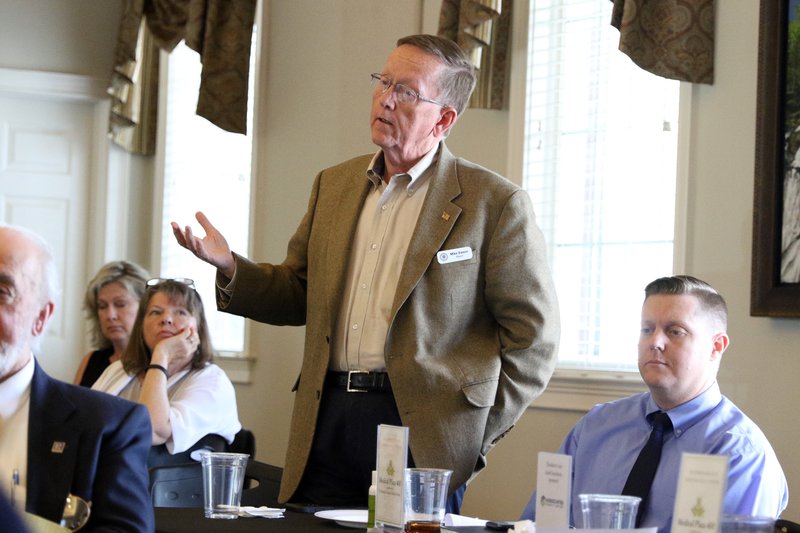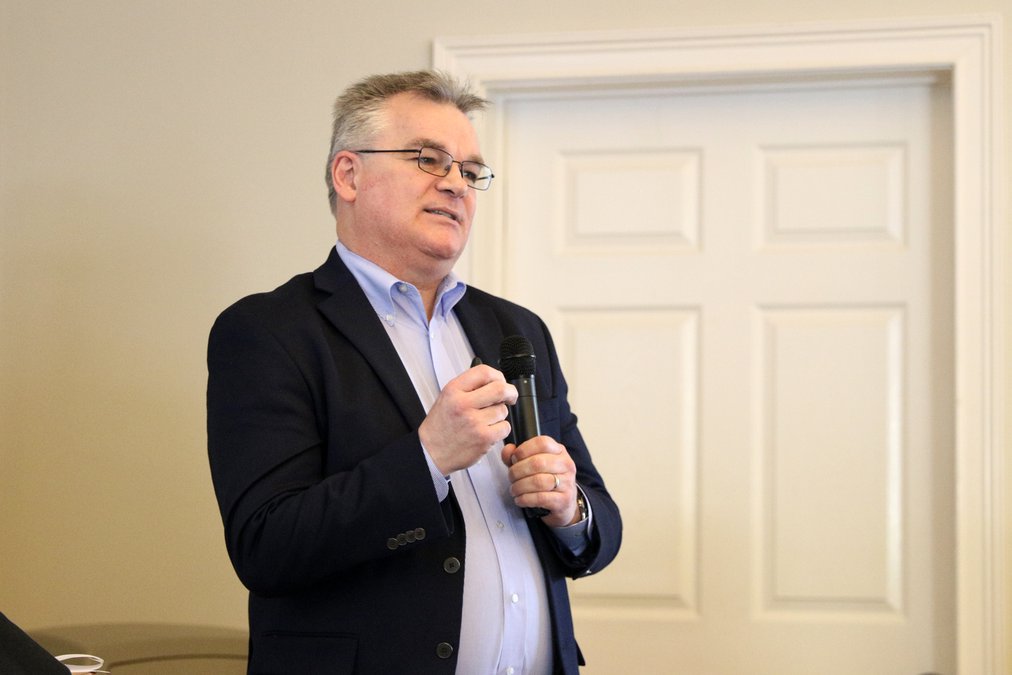The president of Lead Edge Design Group, Phil Eberly, presented information about Elliott Field and the changes it would undergo in its transition from a private airport to public during today’s Dawson County Chamber of Commerce luncheon.
Elliott Field, located off Elliott Family Parkway in Dawsonville, is a 40 year old private airport owned and operated by NASCAR legend Bill Elliott that the city of Dawsonville has plans to purchase and operate as a non-commercial, or General Aviation, airport.
The plans for the airport have to go through both the Georgia Department of Transportation and the Federal Aviation Administration and will require a change from a “private-private” airport to a “public-public” airport.
Lead Edge Design Group is a planning, engineering and economic development firm founded to support General Aviation and community airports and would be assisting with the transition to a public facility.
Eberly, who has more than 30 year experience in site planning, engineering and construction of more than 500 projects, addressed the chamber members on April 11 outlining how the airfield would need to be adapted as a General Aviation airport.
There are currently 104 public use airports in Georgia, or about two thirds of the counties. They are used mainly for business, recreation and medical transport.
For Elliott Field to be flipped to a public airport where those who own planes can keep them and fly in and out on their own schedule, Eberly outlined several site changes that would be made.
Per FAA regulations, the 40 feet wide runway at Elliott Field would need to be widened to 75 feet and new edge lights be installed due to the widening. The airport would also need a new entrance road that is not on private property and tea cup turnarounds installed on the ends of the runway to allow for aircraft to be taxied out and allow other aircraft to use the runway.
According to Eberly, the length of the current runway, which is 5,700 feet, would not be changed.
“If you’re flipping a private airport to public, you usually do not have a paved 5,700 foot runway, that’s weird,” Eberly said.“That puts us ahead of the curve, however FAA taking an airport into the system…that vetting process is incredibly lengthy and bureaucratic.”
Eberly said he speculates that it could be a year and a half before the FAA vetting process for Elliott Field to be classified as a public airport is completed.
“If you had all the money in the universe and you wanted to build an airport from scratch it would take you more than 10 years just from all the processes with FAA and the bureaucratic aspect,” Eberly said.
Eberly said if Elliott Field were publicly owner, fuel sales could pay for airport maintenance, new hangars could be paid for by tenants under a long term lease that would revert ownership back to the airport after the term of the lease, and ad valorem taxes on aircraft.
Also addressed were concerns from the community regarding noise
“Driven out of perhaps conscious but I can tell you absolutely from an economic standpoint the engines have gotten much more efficient and they’re much more quiet,” Eberly said.
Dawson County Chamber of Commerce President Christie Moore also agreed that the level of noise would not change with the transition to a municipal airport.
“When Chase Elliott won his first race, we all went out to the field. I was standing there for hours. No one knew the plane was coming in until it hit the ground,” Moore said. “Noise-wise I will tell you, it was shocking. You could not hear it.”
Moore said she knows the community has some fears about the impact to the area and admitted that her first thought of an airport was Hartsfield-Jackson in Atlanta.
“I think that is something to really keep in mind is if you’re not hearing them now you’re likely not going to hear them when it becomes a municipal airport because we’re looking at the same type of aircrafts,” Moore said.

Another concern was the cost to the local taxpayers. With the transition to a public airport and upon meeting the requirements with the FAA, the FAA would pay 90 percent of the project, with a 5 percent match from GDOT and 5 percent local match.
Dawsonville Mayor Mike Eason said Thursday afternoon that the Elliott family has been willing to donate money for the local match.
“One of the goals that we had was not to spend our taxpayers’ dollars to fund the airport,” Eason said.
“We hope this will be an engine that’ll help drive our economic development here in our community,” he added.
Eason said that if the community has any questions regarding Elliott Field, the city is there to answer any concerns.
Though it is too early to begin community information meetings on the project, Moore and Eason said the chamber and the city will work to make information available to the community throughout the process.

